NURSING, ECONOMICS, MATHEMATICS, BIOLOGY, ENGINEERING AND HISTORY MATERIALS
BEST TUTORING, HOMEWORK HELP, EXAMS, TESTS, AND STUDY GUIDE MATERIALS WITH GUARANTEED A+ RESALTS
I am a dedicated medical practitioner with diverse knowledge in matters of Nursing, Mathematics, and history.
- 184
- 0
- 0
Community
- Followers
- Following
184 items
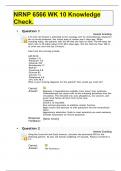
NRNP 6566 WK 10 Knowledge Check.
NRNP 6566 WK 10 Knowledge Check. A 57 year old female is admitted to the oncology unit for chemotherapy related to her to acute leukemia. Her initial dose of chemo was 2 days ago. While rounding today, the patients tells the NP that she feels so weak. The NP notes her heart rate is 44 today (down from 68 2 days ago). She has had less than 100 cc of urine out over the last 24 hours. Labs from this morning include: LAB DATA: -Sodium 131 -Potassium 7.8 -Chloride 105 -Bicarbonate 1...
- Exam (elaborations)
- • 9 pages •
NRNP 6566 WK 10 Knowledge Check. A 57 year old female is admitted to the oncology unit for chemotherapy related to her to acute leukemia. Her initial dose of chemo was 2 days ago. While rounding today, the patients tells the NP that she feels so weak. The NP notes her heart rate is 44 today (down from 68 2 days ago). She has had less than 100 cc of urine out over the last 24 hours. Labs from this morning include: LAB DATA: -Sodium 131 -Potassium 7.8 -Chloride 105 -Bicarbonate 1...
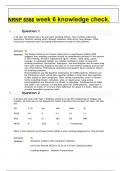
NRNP 6566 week 6 knowledge check.
NRNP 6566 week 6 knowledge check. A 54 year old female has a 30 year pack smoking history. She recently underwent pulmonary function testing which showed moderate obstructive lung disease. What would your treatment plan (including medications) include for this patient? Correct Answer: The Global Initiative for Chronic Obstructive Lung Disease (GOLD) 2020 suggests that smoking cessation should be immediately pursued if the patient is still smoking. Nicotine replacement (gum, inhal...
- Exam (elaborations)
- • 8 pages •
NRNP 6566 week 6 knowledge check. A 54 year old female has a 30 year pack smoking history. She recently underwent pulmonary function testing which showed moderate obstructive lung disease. What would your treatment plan (including medications) include for this patient? Correct Answer: The Global Initiative for Chronic Obstructive Lung Disease (GOLD) 2020 suggests that smoking cessation should be immediately pursued if the patient is still smoking. Nicotine replacement (gum, inhal...

NRNP 6566 Week 5 Knowledge Check
NRNP 6566 Week 5 Knowledge Check QUESTION 1 1. A 54-year women is 3 days post abdominal surgery for removal of a cancerous mass in her abdomen. She develops acute shortness of breath associated with tachycardia and hypotension. CT Scan of the chest is positive for multiple small pulmonary embolism. What medication and dosing would you order initially to treat the pulmonary embolism? This patient should be given fondaparinuc (Arixtra) subcutaneously. Dosing is weight- based: 1. 5 mg SQ on...
- Exam (elaborations)
- • 4 pages •
NRNP 6566 Week 5 Knowledge Check QUESTION 1 1. A 54-year women is 3 days post abdominal surgery for removal of a cancerous mass in her abdomen. She develops acute shortness of breath associated with tachycardia and hypotension. CT Scan of the chest is positive for multiple small pulmonary embolism. What medication and dosing would you order initially to treat the pulmonary embolism? This patient should be given fondaparinuc (Arixtra) subcutaneously. Dosing is weight- based: 1. 5 mg SQ on...

NRNP 6566Week 4 knowledge check.
NRNP 6566Week 4 knowledge check. A 47 year old male admitted with an infected elbow wound. On his second day in the hospital you find him in his room confused and agitated. Vital signs are as follows: Temperature – 96.2 °F Pulse -140 beats per minute Respirations – 40 breaths per minute Blood Pressure – 90/40 mmHg Labs include a WBC count of 3,000 Pt weighs 185 pounds Further assessment of him includes: Urine output of 100cc for the last 8 hours Pulse oximetry of 88% o...
- Exam (elaborations)
- • 7 pages •
NRNP 6566Week 4 knowledge check. A 47 year old male admitted with an infected elbow wound. On his second day in the hospital you find him in his room confused and agitated. Vital signs are as follows: Temperature – 96.2 °F Pulse -140 beats per minute Respirations – 40 breaths per minute Blood Pressure – 90/40 mmHg Labs include a WBC count of 3,000 Pt weighs 185 pounds Further assessment of him includes: Urine output of 100cc for the last 8 hours Pulse oximetry of 88% o...
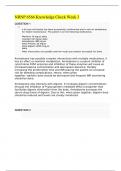
NRNP 6566 Knowledge Check Week 3
NRNP 6566 Knowledge Check Week 3 Amiodarone has possible complex interactions with multiple medications. It has an effect on warfarin metabolism. Amiodarone is a potent inhibitor of cytochrome P450 enzymes and inhibition of these enzymes will cause an increased plasma concentration and decreased clearance; thereby increasing the prothrombin time and INR placing the patient at increased risk for bleeding complications. Hence, when given together, warfarin dose should be decreased and frequent...
- Exam (elaborations)
- • 7 pages •
NRNP 6566 Knowledge Check Week 3 Amiodarone has possible complex interactions with multiple medications. It has an effect on warfarin metabolism. Amiodarone is a potent inhibitor of cytochrome P450 enzymes and inhibition of these enzymes will cause an increased plasma concentration and decreased clearance; thereby increasing the prothrombin time and INR placing the patient at increased risk for bleeding complications. Hence, when given together, warfarin dose should be decreased and frequent...
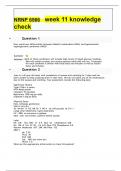
NRNP 6566 week 11 knowledge check
NRNP 6566 week 11 knowledge check How would you differentiate between diabetic ketoacidosis (DKA) and hyperosmolar hyperglycemic syndrome (HHS)? Correct Answer: Both of these conditions will include high levels of blood glucose readings. DKA will exhibit acidosis and urinary ketones while HHS will not. Treatment for each condition is similar with fluid bolus and infusion as well as insulin bolus and infusion. Juan is a 42 year old male with complaints of nausea and vomiting for...
- Exam (elaborations)
- • 9 pages •
NRNP 6566 week 11 knowledge check How would you differentiate between diabetic ketoacidosis (DKA) and hyperosmolar hyperglycemic syndrome (HHS)? Correct Answer: Both of these conditions will include high levels of blood glucose readings. DKA will exhibit acidosis and urinary ketones while HHS will not. Treatment for each condition is similar with fluid bolus and infusion as well as insulin bolus and infusion. Juan is a 42 year old male with complaints of nausea and vomiting for...
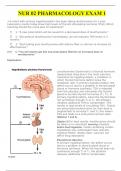
NUR 02 PHARMACOLOGY EXAM 1
NUR 02 PHARMACOLOGY EXAM 1 1-A client with primary hypothyroidism has been taking levothyroxine for 1 year. Laboratory results today show high levels of thyroid stimulating hormone (TSH). Which teaching should the nurse plan to implement? 1. "A new prescription will be issued for a decreased dose of levothyroxine." 2. "Discontinue levothyroxine immediately; we will reassess TSH levels in 3 months." 3. "Start taking your levothyroxine with dietary fiber or calci...
- Exam (elaborations)
- • 68 pages •
NUR 02 PHARMACOLOGY EXAM 1 1-A client with primary hypothyroidism has been taking levothyroxine for 1 year. Laboratory results today show high levels of thyroid stimulating hormone (TSH). Which teaching should the nurse plan to implement? 1. "A new prescription will be issued for a decreased dose of levothyroxine." 2. "Discontinue levothyroxine immediately; we will reassess TSH levels in 3 months." 3. "Start taking your levothyroxine with dietary fiber or calci...

NUR 02 CRITICAL CARE 01
NUR 02 CRITICAL CARE 01 01 A client undergoing endotracheal intubation received IV sedation and succinylcholine. Shortly after respiratory status has been stabilized, the client becomes flushed, profusely diaphoretic, and has a rigid jaw. Which medication should the nurse prepare to administer? Click the exhibit button for more information. 1. IM epinephrine 2. IV atropine 3. IV dantrolene 4. IV glucagon Explanation: Malignant hyperthermia (MH) is a rare an...
- Exam (elaborations)
- • 114 pages •
NUR 02 CRITICAL CARE 01 01 A client undergoing endotracheal intubation received IV sedation and succinylcholine. Shortly after respiratory status has been stabilized, the client becomes flushed, profusely diaphoretic, and has a rigid jaw. Which medication should the nurse prepare to administer? Click the exhibit button for more information. 1. IM epinephrine 2. IV atropine 3. IV dantrolene 4. IV glucagon Explanation: Malignant hyperthermia (MH) is a rare an...
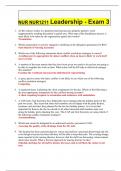
NUR NUR1211 Leadership - Exam 3
NUR NUR1211 Leadership - Exam 3 1. An Rn witness worker in a paralyzed and unconscious pediatric patient’s room inappropriately touching the patient’s genital area. What step of the disciplinary process is most likely to be taken by the organization against this worker? Termination 2. Which organization is actively engaged in clarifying to the delegation parameters for RNs? State Boards of Nursing Licensure 3. Which one of the following statements about conflict resolutions strate...
- Exam (elaborations)
- • 7 pages •
NUR NUR1211 Leadership - Exam 3 1. An Rn witness worker in a paralyzed and unconscious pediatric patient’s room inappropriately touching the patient’s genital area. What step of the disciplinary process is most likely to be taken by the organization against this worker? Termination 2. Which organization is actively engaged in clarifying to the delegation parameters for RNs? State Boards of Nursing Licensure 3. Which one of the following statements about conflict resolutions strate...

NUR 1211 LEADERSHIP EXAM 2
NUR 1211 LEADERSHIP EXAM 2 1. An RN in the emergency department is assessing an elderly client. The client’s son states that the client has glaucoma, is extremely hard of hearing, and has been experiencing severe abdominal cramping and diarrhea or the past 24 hrs. Which of the following actions is most appropriate for the nurse to do FIRST? a. Ask the client if he is wearing or has with him a hearing aid. 20. What is the primary purpose of laws and legislation? a. To protect the nurse...
- Exam (elaborations)
- • 10 pages •
NUR 1211 LEADERSHIP EXAM 2 1. An RN in the emergency department is assessing an elderly client. The client’s son states that the client has glaucoma, is extremely hard of hearing, and has been experiencing severe abdominal cramping and diarrhea or the past 24 hrs. Which of the following actions is most appropriate for the nurse to do FIRST? a. Ask the client if he is wearing or has with him a hearing aid. 20. What is the primary purpose of laws and legislation? a. To protect the nurse...
